Brock McLean’s double life battling alcohol and drug issues and an eating disorder — and the remarkable road back
Brock McLean concedes he abused drugs and alcohol throughout his AFL career with Melbourne and Carlton. Yet he was able to put on a “false front” to fool his teammates and coaches while juggling three-day benders with professional sport.
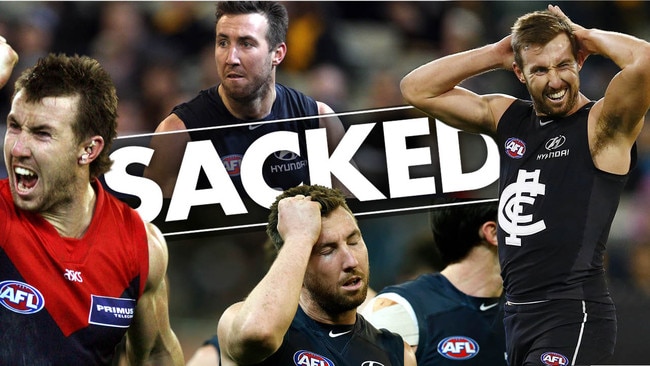
AFL
Don't miss out on the headlines from AFL. Followed categories will be added to My News.
Brock McLean was sacked during an off-season bender in a Copenhagen strip club.
At face value it was a fitting full stop on a 157-game career full of massive controversies and notable moments.
In a decade at Melbourne and Carlton, McLean was a hard-charging, hard-living onballer whose reputation for boozy off-season scraps and minor misdemeanours was more reflective of football's former generation.
Now McLean is finally ready to reveal the hidden turmoil that he disguised from all but his close mates.
It is one of drug and alcohol abuse during his career that spiralled into bulimia, a post-AFL suicide attempt and finally a 2019 bipolar diagnosis.
As McLean says, his time in football makes so much more sense now he has been properly diagnosed.
SUBSCRIBE TO THE SACKED PODCAST HERE
The 48-hour benders mixing booze, cocaine, ecstasy and speed after Friday night games, the times he would lock himself in his room with his dog and weep until there were no tears left.
The sense of abject failure he could not shake throughout those 11 seasons under Neale Daniher, Dean Bailey, Brett Ratten and Mick Malthouse.
The off-season blue that saw him and teammates locked up overseas, with news breaking while the AFL’s stars were strutting the red carpet.
And even the brutal honesty and desperation for footy justice that saw him unwittingly spark the Melbourne tanking investigation with a spin-free reply on Fox Footy’s On The Couch three years after the Demons’ 2009 season.
Speaking for the first time about that secret life to heraldsun.com.au’s Sacked podcast, the 34-year-old says only now is he prepared to lay bare the demons that plagued him.
“I go back to when I was 18 or 19 and going through these massive emotional rollercoasters and at the time I thought, “I do have something wrong with me”,” he told the Herald Sun this week.
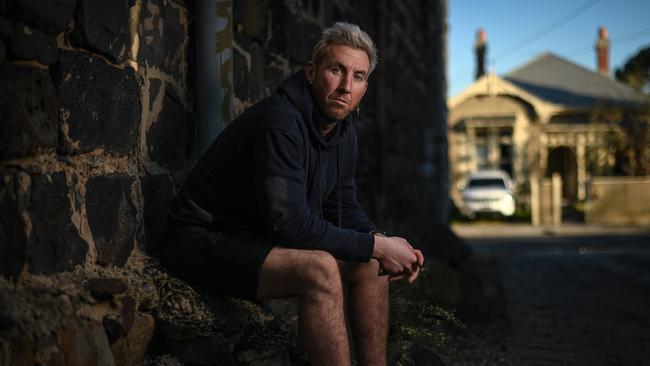
“There was very little spoken about mental health and I remember catching myself and saying, “Don’t be a drama queen, just get on with it”.
“And that was my life, a massive emotional rollercoaster that persisted until I got diagnosed.
"I got to the point where I was self-medicating. I wasn’t an alcoholic. But I was an alcohol abuser and I was a drug abuser. Looking back now, how did something even worse not happen. It was mostly cocaine and ecstasy, those were my two vices. It was a way of self-medicating because one point in my life that actually worked.
“I would go on three or four day benders. (It got) to the point where if we played Friday night I would go out Friday night and go through until 3am or 4am Monday morning and then have three or four hours sleep and then go into the club on Monday morning and try to train or fit in as I normally could. I had so much practice I was pretty good at it.
“You would feel depressed and try to escape that feeling and go and drink and use drugs and then you would be back at square one. It perpetuated the depression but you can’t see it because you are in a vicious cycle.”
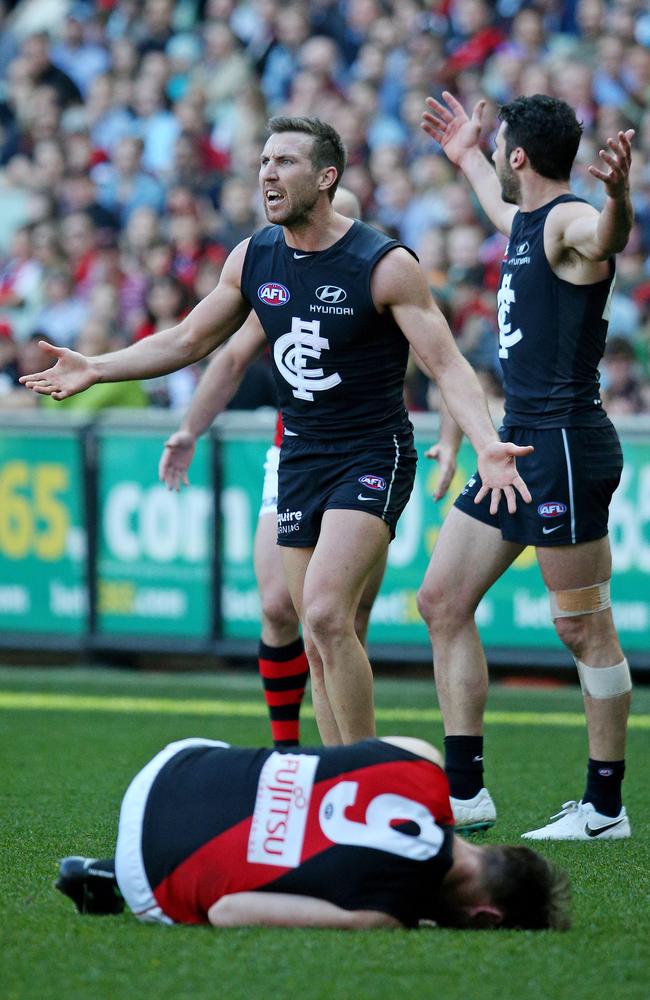
ROCK BOTTOM
Brock McLean burst onto the football landscape in 2004 as a junior prodigy who mixed the best of football’s eras.
The No.5 draft pick in the 2003 national draft had the larrikin, knock-about ways of uncle Ricky McLean, a renowned Carlton hard-man, but was gifted with the elite running and ball-winning skills to thrive in the athletic modern game.
By the third of his six seasons at Melbourne he was a star on the rise, his 25-possession, two-goal match-winning performance in the 2006 elimination final evidence he could do it all (and unwittingly consigning Grant Thomas to his own sacking a day later).
Yet already he was battling with a void that no best-afield performance could fill.
“I would put this act on, this jovial guy who was the joker and trained so hard and the downside of that is you used up so much energy putting on a false front that when you got home you were just spent," he says.
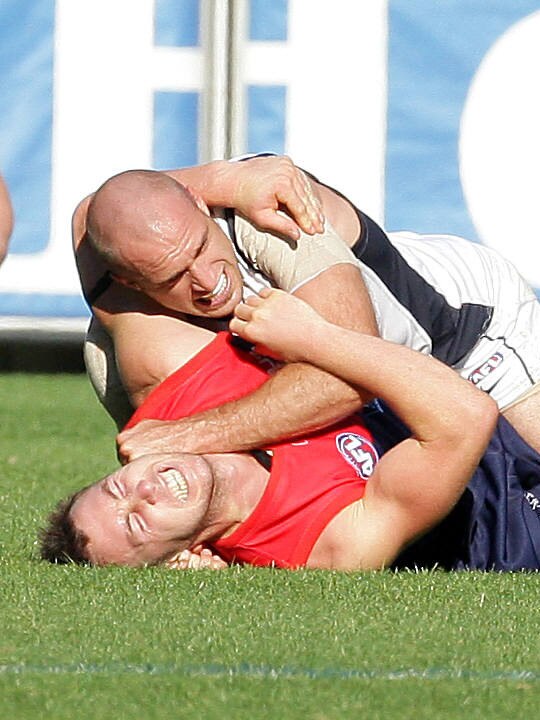
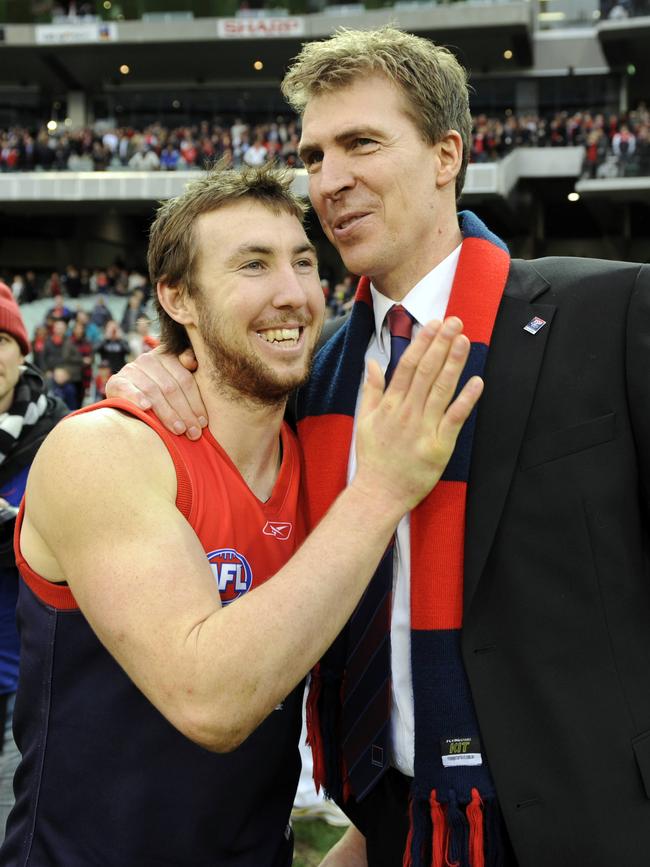
“I had a story in my head that if I showed how I was really feeling that was a sign that I was a weak person, letting mental health issues affect my day to day.”
In an era when alcohol still considered a welcome release and reward for toil in football, McLean took to it like a duck to water.
He never looked back.
“The basis of my troubles was I had a horrible relationship with myself. I was black and white in my thinking - you are a horrible person. Massive alcohol and drug binges which made it even worse.
“I grew up in a heavy-drinking culture and then footy supported that culture. When we trained we trained hard, but when we played we played hard.”
McLean was part of a tight-knit group of Melbourne players but says most of his benders happened by stealth, the young star happy to crash random parties or hit nightclubs with new friends in search of another high.
“It was bingeing. It was almost like a reward or treat. You had a hard four week block, time to reward yourself.”
Remarkably in those 11 seasons he had only a single positive illicit drugs test despite running the gauntlet while being regularly target-tested by the AFL.
“I had one. I think I might have taken some speed or ecstasy, it was just before a mid-season break. We had played on the Friday night and were not due back at the club until Tuesday and it was for country clinics or something like that.
“I had been on a bender all weekend, I went out Friday night and we finished Monday morning. It was a fairly decent crack and I couldn’t have told you what I took or in terms of volume but I took a wide range of drugs. Cocaine and ecstasy and speed. Those were the three and then got drug tested on the (next) Tuesday.
“I was drinking so much later that day (to flush the drugs from his system), I was pissing water and I thought, ”I should be fine with this”, but got a call a month later from our doc first and had a call with the AFL doctors and assured them it was just a one-off and I was pretty good at lying and hiding my issues back then. I had quite a while practising this routine and from then on I got target tested.”
By then McLean was also battling mild to severe sleep apnea, his days and nights full of panic about the ramifications of being caught again.
It didn’t stop his drug-use in any way.
“That’s not how mentally unwell people process information,” he says with a chuckle.
“So having a drug strike over my head, again when you go out and drink alcohol, your decision-making is hindered. If I was dead sober, no way. I never wanted to touch drugs but as soon as alcohol hit the lips, that was like a green light. It was like, bang, we are on here, let’s go boys.
“There were times when I would do cocaine up until a Sunday afternoon and then was getting tested on Monday morning and I was like, “Shit, I am done here, I am goneski,” and somehow I didn’t get a positive test. All I can gather from that is that cocaine is in and out of your system pretty quickly.”
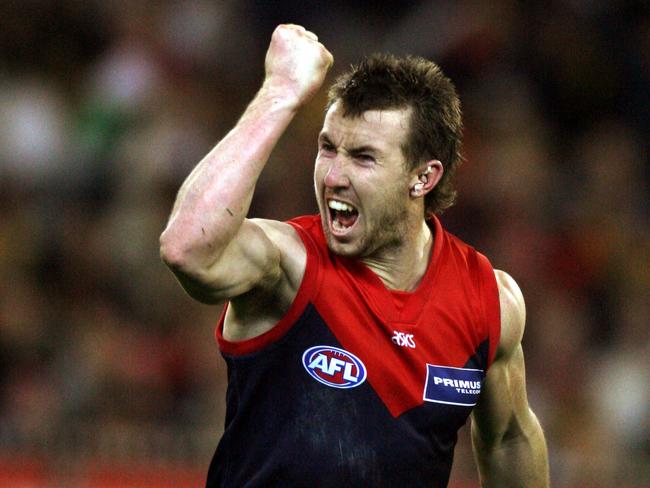
MCLEAN’S EATING DISORDER
After six years at Melbourne McLean needed a break, with his first football home ravaged by a losing culture (more about that later) as Carlton secured him in a trade for their No.11 draft pick.
He trained obsessively over that summer but it resulted in a disastrous initial season with three knee surgeries linked to overuse then a late-season ankle operation.
As a runner McLean was a relentless grinder, more in the Robert Harvey run-all-day mould than Dane Swan’s explosive bursts.
But as Carlton urged him to strip weight to gain speed, he took that process to a dangerous level.
“I was bulimic for two or three years towards the end of my career. I played at 85kg and I naturally stripped 5kg to play and that was a really comfortable weight.
“But the coaches wanted me to come back at 83kg with my leg speed so I diligently got down to 83kg and was barely eating everything.
“My diet was so regimented, stripping fat off meat and making sure I weighed food.
“It got to the point where I needed junk food or a binge so like alcohol I would go on a food binge and eat shit. I would eat my dinner and say, “I feel like something naughty”, and go out and get some chocolate, then I would be, “F---, you can’t do that, you are going to put on weight.”
“I would think if I put on weight the coaches are going to see it and not play me so that’s when I started to make myself throw up. “So I was (throwing up) every night. It was quite consistent through 2012 and 2013. In 2010 and 2011 it was when it started but 2012 was probably the really bad time in terms of my eating disorder and bulimia.
“I never truly got over it until therapy.”
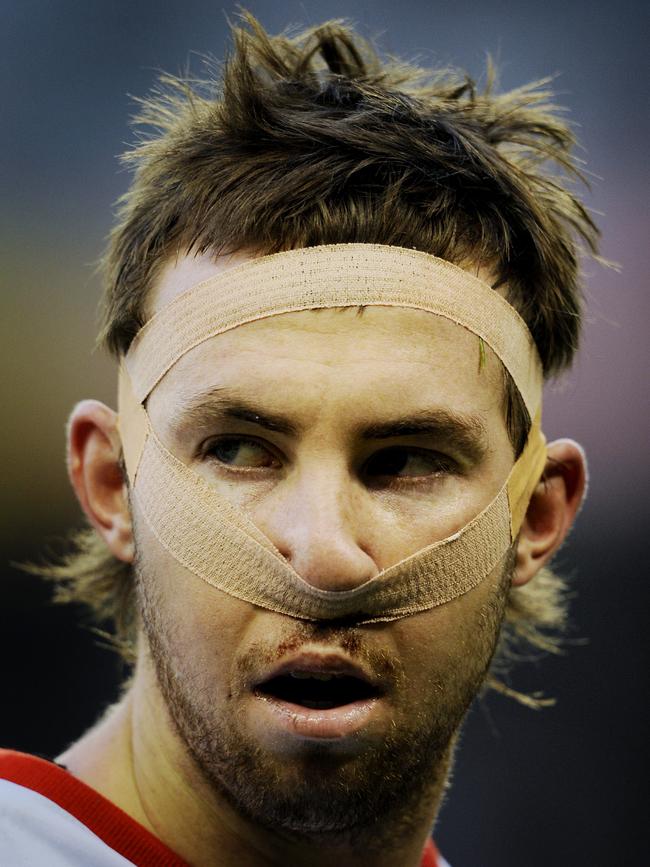
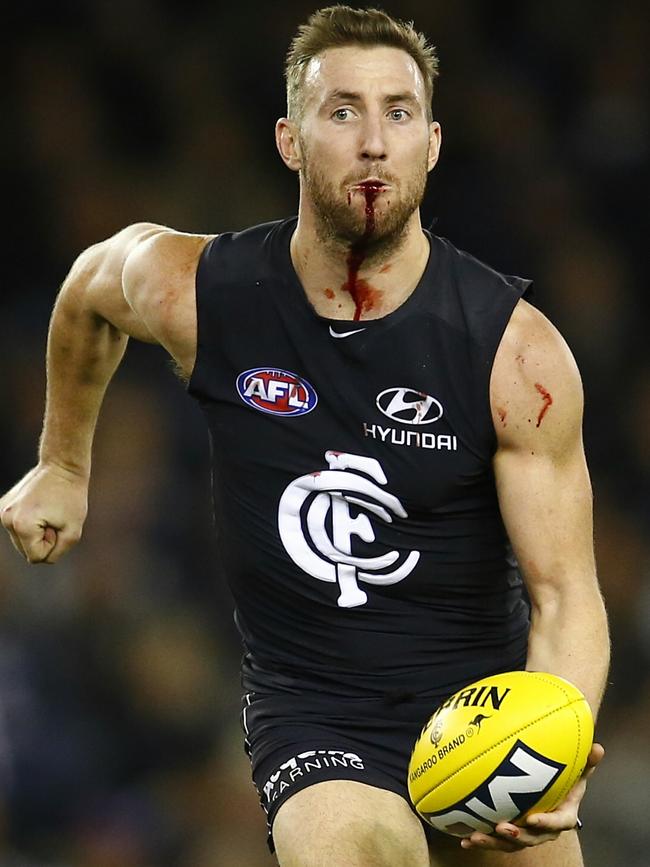
SACKED IN COPENHAGEN
McLean had arrived at Carlton with the pitch to round out a midfield that included Chris Judd, Marc Murphy and Bryce Gibbs but through injury and form issues cobbled together only 10 games in 2010-11.
Then came a trio of years through 2012-14 where McLean hit his stride with 53 games, playing finals in 2013 before a seven-win 2014 season under Mick Malthouse.
In his last game, a Round 23 draw against Essendon, he peeled off 30 possessions and kicked a goal and was handed two Brownlow votes to boot.
The former prodigy was no longer the first-line midfielder as Patrick Cripps won his first John Nicholls Medal but knew he belonged on an AFL list.
Off contract, he headed off to Europe after being told in his exit meetings he was a wanted player.
“I was told I was a required player and that everything would be sorted out once I got back from overseas. They knew I was going on a trip. I think Adam Ramanauskas, who was my manager at the time, got in touch with me and said, “I am starting to get a bit worried, mate. The offer hasn’t come through. Then I had a call from (Carlton football boss) Andy McKay.
“I was travelling by myself, I was in a strip club in Copenhagen, me and some guys from the hostel I was staying at. He said it looks bad. Unless something dramatic changes, you will be done.
“The conversation with Macca was pretty forthright. I think I told him to go and “eff” himself at the end of the conversation and hung up. I had had a skinful by then.
“Not being able to process my emotions or being able to process bad news well, my answer was to run away or hide behind the bottle or drugs. I was devastated and not having someone there to open up to, I was, “Righto, let’s launch”.
“I just went on a bender to end all benders and then I was in London when I got the official call. Your time is done now, we are going to delist you.”
Coach Malthouse wasn’t involved in informing him of his delisting, with McLean creating headlines when he spoke of his disappointment.
At 28, his career was over and having committed to a season without commitments he had no limitation living a block back from Melbourne hot spot Chapel St.
“I got from being regimented and not being allowed to drink during the week, and I had this new found freedom and I took to it like a duck to water,’’ he says.
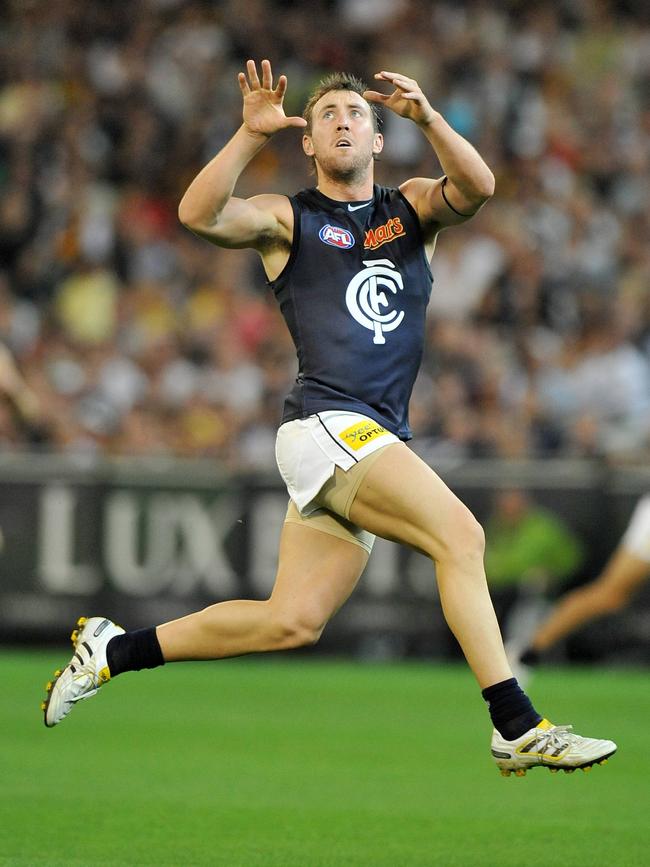
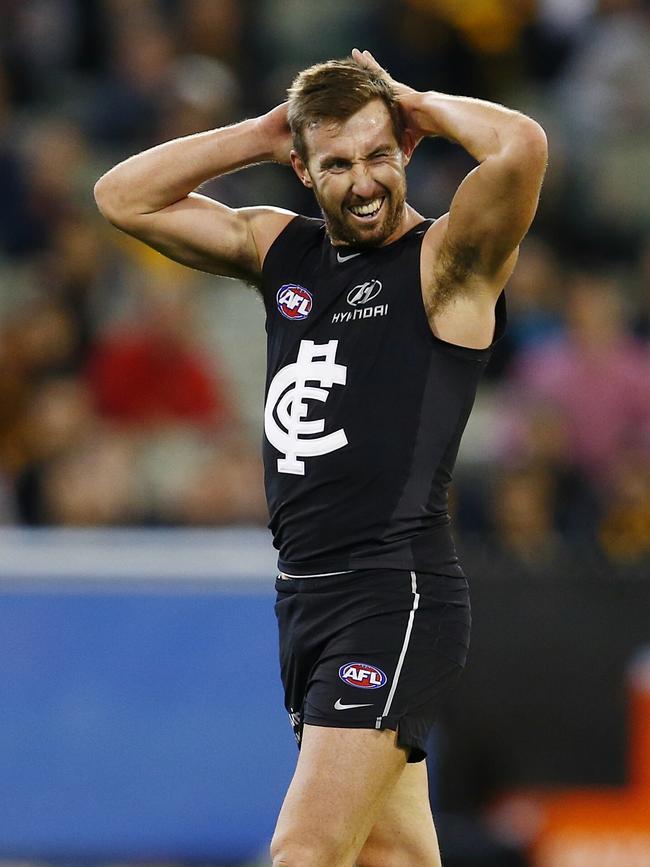
THE ASCENT FROM ROCK BOTTOM
McLean’s three-year journey from the darkest depths has been filled with moments of stunning clarity and life-threatening setbacks.
He moved to a career in finance while also playing local football and studying a commerce degree full time, all the while charging hard on drug and alcohol binges.
“My self-worth was tied to what I was doing and when I was a footballer I had a high self-worth so when I finished footy I was at the bottom rung and it got to the point in my life where I was like, “I can’t do this any more” and I tried to kill myself,” says McLean.
By the start of 2017 he had finally succumbed to his partner’s urgings to see a psychologist, but only months later he was at rock bottom.
“It was in August 2017, I wont talk about the method because that can stoke ideas but I spend two or three days in ICU in St Vincent’s Hospital and another two or three days in the general ward while I got over my attempted suicide ailments and then spent three weeks in the Melbourne Clinic, a psychiatric ward. Even then I didn’t fully grasp how unwell I was.
“So I got out, got off the grog for a few months and once I had a drink the old habits came back.”
“I was in a relationship where I was really unhappy but couldn’t bring myself to break up with her because I didn’t want to break her heart and everything came to a head because I ended up cheating on her. She found out and bang, I was back to square one again. I went on a weekend bender.”
MORE AFL NEWS:
AFL chief executive Gillon McLachlan confirms AFL restart plans
AFL to release new fixture for first matches of footy’s restart in next 10 days
Four clubs will relocate to Gold Coast hub and families can join them
His partner filed a missing persons report with Victoria police - “I remember getting texts from police saying can you get in touch” - but to her credit never gave up on McLean.
“I went into a deep spiral and had a suicide plan in place. She found out, got into my computer and saw what I was planning to do and to her credit she cared about me even though the way I had treated her was horrible. She said, “You have to go back to the Melbourne Clinic, and I spent another five weeks there.”
There have been relapses, but last March McLean was finally diagnosed with a bipolar disorder.
“Having the diagnosis and being on the correct medication, that was the first thing. And then changing my relationship with myself, Learning to love myself, learning to have compassion and empathy for myself.
“When someone in my life was struggling I was the first there. I was the first to empathise, care for them, not judge them, but I could never do it for myself.
“There are certain reasons for that dating back to my childhood which I don’t want to get into because there are figures I want to protect, but through consistent therapy, it works. I have been going for three years and am really starting to see the benefits.”
Last August McLean went to Barbados for a friend’s wedding and reunited with old mates with what turned into “basically a week-long bender”.
“I was at the airport ready to fly home and I was in a horrid place mentally and it was at the point where it was, “Let’s get off the grog for a month”.
“I had made changes with drinking but it was still all or nothing. So I got off the grog and the more I got off the grog the better I felt. The more I realised I actually enjoy not drinking more than I do. So I haven’t had a drink since then and haven’t looked back and have enjoyed every minute of it. And that was the last piece of the puzzle for me.”
Originally published as Brock McLean’s double life battling alcohol and drug issues and an eating disorder — and the remarkable road back
